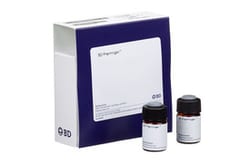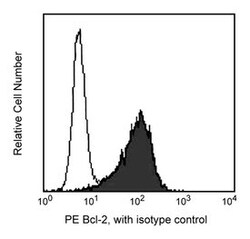Learn More
Bcl-2 Set Mouse anti-Human, PE, Clone: Bcl-2/100, BD
Mouse Monoclonal Antibody
Supplier: BD Biosciences 556535
Description
Programmed cell death (apoptosis) is a normal physiologic process which occurs during embryonic development as well as in maintenance of tissue homeostasis. The apoptotic program is characterized by certain morphological features. These include changes in the plasma membrane such as loss of membrane asymmetry and attachment, a condensation of the cytoplasm and nucleus, and internucleosomal cleavage of DNA. In the final stages, the dying cells become fragmented into “apoptotic bodies” which are rapidly eliminated by phagocytic cells without eliciting significant inflammatory damage to surrounding cells. Members of the Bcl-2 family play a major role in regulating the response of cells to apoptotic signals. Bcl-2 is considered to be novel among proto-oncogenes because it blocks apoptosis in many cell types. Bcl-2 is thought to provide selective survival advantage for cells by blocking apoptosis and thus may contribute to tumorigenesis. Bcl-2 is a 26 kDa intracellular, integral membrane protein found primarily in the nuclear envelope, endoplasmic reticulum and outer mitochondrial membrane.
Clone Bcl-2/100 reacts with human Bcl-2. It does not cross-react with mouse Bcl-2. A synthetic peptide corresponding to amino acids 41-54 (GAAPAPGIFSSQPG) of human Bcl-2 was used as immunogen. This peptide sequence is not conserved between human and mouse. Clone Bcl-2/100 was initially characterized by western blotting and immunohistochemistry of frozen and paraffin-embedded tissue sections. Clone MOPC-21 is a mouse IgG1 isotype control. The MOPC-21 antibody has unknown specificity.

Specifications
| Bcl-2 Set | |
| Monoclonal | |
| PE | |
| Affinity Purified | |
| RUO | |
| PE Mouse Anti-Human Bcl-2 (100 tests), PE Mouse IgG1, κ Isotype Control (100 tests) | |
| Store undiluted at 4°C and protected from prolonged exposure to light. Do not freeze. |
| Flow Cytometry | |
| Bcl-2/100 | |
| Mouse | |
| 100 Tests | |
| Primary | |
| Human | |
| IgG1 |
Your input is important to us. Please complete this form to provide feedback related to the content on this product.
For Research Use Only.

